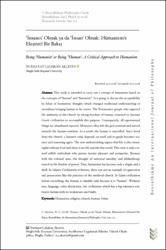Being 'Humanist' or Being "Human' A Critical Approach to Humanism
Abstract
This study is intended to carry out a critique of humanism based on the concepts of "human" and "humanist". It is going to discuss the acceptability by Islam of humanistic thought, which changed traditional understanding of sacredness bringing human to be center. The Renaissance people who opposed the authority of the church by taking freedom of human, returned to Ancient Greek civilization to accomplish this purpose. Consequently, all supernatural things are abandoned rejected. Moreover, they left the god centrism and moved towards the human-centrism. As a result, the human is sanctified. Since freed from the church, a human's value depends on itself and its guide becomes science and reasoning again The new understanding argues that life is also meaningful without God and there is no life outside this world. This view is only created selfish individuals who pursue instant pleasure and prosperity. Because with the colonial wars, the thought of universal morality and philanthropy stayed in the shadow of power. Thus, humanism has become only a slogan and a shell. In Islamic Civilization in history, there was not an example of oppression and persecution like the practices of the medieval church. In Islam civilization before everything, the human is valuable only because it is "human". Without race, language, color distinction, our civilization which has a big tolerance embraces human with its weaknesses and faults.


















